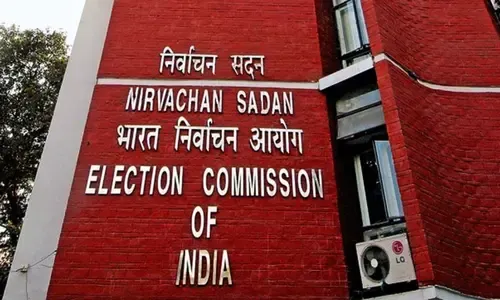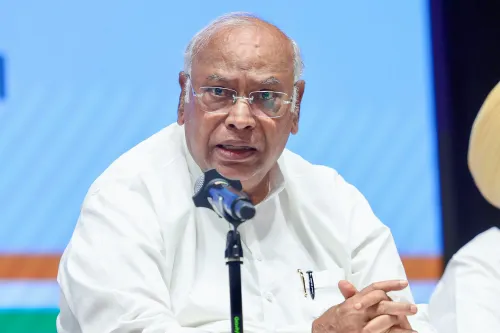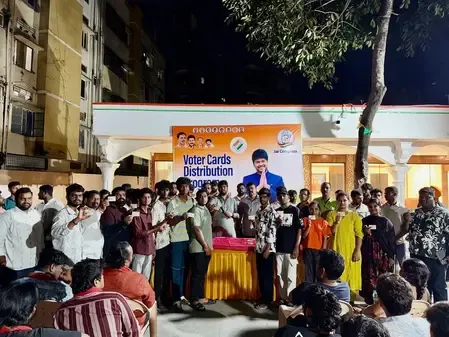Why is the ECI Refusing to Share Details of Omitted Voters?

Synopsis
Key Takeaways
- The ECI has filed an affidavit against disclosing omitted voter details.
- Approximately 65 lakh electors are affected by this situation.
- The ECI is not legally required to share reasons for omissions.
- Voters can submit Form 6 to claim their inclusion.
- Political parties have been involved in outreach efforts.
New Delhi, Aug 10 (NationPress) The Election Commission of India (ECI) has submitted an affidavit to the Supreme Court challenging the Association for Democratic Reforms (ADR)'s request for constituency and booth-wise data concerning approximately 65 lakh voters whose enumeration forms were not filed.
The ADR's petition called for two specific actions: firstly, to release a constituency and booth-wise list of omitted voters, citing reasons such as death, permanent relocation, duplication, or being untraceable; secondly, to unveil the identities of voters whose enumeration forms were deemed "not recommended" by the Booth Level Officers (BLOs).
In its response, the electoral body asserted that the legal framework under the Representation of People Act, 1950, and the Registration of Electors Rules, 1960, does not require the creation or publication of such a list.
It emphasized that the ECI is not obligated to generate or disclose any additional list of individuals excluded from the draft electoral rolls, nor to explain the reasons for anyone's exclusion.
“Since neither the law nor the guidelines necessitate the preparation or sharing of such a list concerning previous voters whose enumeration forms were not submitted for any reason during the Enumeration phase, the petitioner cannot claim such a list as a matter of right,” the affidavit outlined.
Furthermore, any qualified voter whose name is absent may submit Form 6 along with a declaration to claim their inclusion in the draft electoral rolls during the claims and objections period, which runs from August 1 to September 1.
This process implicitly confirms that the applicant is not deceased, has not permanently moved, or is not untraceable, according to the ECI.
“Therefore, providing justifications for non-inclusion along with a list of names serves no practical purpose, as the procedure for all three aforementioned reasons remains unchanged: filing Form 6 along with a Declaration under Annexure-D,” stated the ECI.
The response document asserted that the ADR's claim that individuals whose names are omitted from the draft rolls cannot seek appropriate remedies is “false, misconceived, and untenable.”
The ECI clarified that the omission of a name from the draft rolls does not equate to removal from the electoral rolls.
“The draft roll simply indicates that the duly filled enumeration form of existing voters was received during the enumeration phase,” the electoral body explained.
Prior to the publication of the draft electoral roll, the ECI instructed the Chief Electoral Officer (CEO), District Election Officers (DEOs), Electoral Registration Officers (EROs), and BLOs to provide political parties with booth-level lists of individuals whose enumeration forms had not been received, seeking their assistance in contacting these voters.
“Such meetings were conducted in all districts, and the lists were duly delivered to recognized political parties through their district presidents and appointed Booth Level Agents (BLAs),” the affidavit stated.
Additionally, after the draft rolls were published, political parties received an updated list of electors whose names were not included, ensuring every effort was made to contact these individuals, so no eligible voter was overlooked.
“Political parties confirmed receipt of the provided list, which also included acknowledgments from CPI(M-L),” the ECI remarked.
It highlighted that voters can verify their status online by entering their EPIC number on the ECI's official website, which also provides contact details for BLO assistance.
“Thus, the petitioner's actions represent a blatant attempt to mislead this Hon'ble Court by making evidently false and erroneous claims in the application. The petitioner’s approach is consistent with previous efforts to discredit the ECI through the dissemination of false narratives across digital, print, and social media,” the affidavit concluded, urging the apex court to impose substantial costs and consider contempt proceedings against the ADR.









